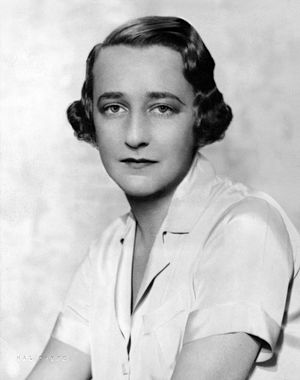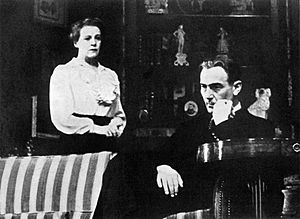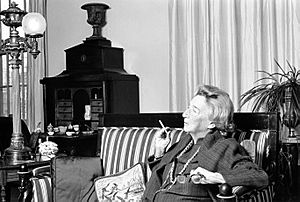Lillian Hellman facts for kids
Quick facts for kids
Lillian Hellman
|
|
|---|---|

Hellman in 1935
|
|
| Born | Lillian Florence Hellman June 20, 1905 New Orleans, Louisiana, U.S. |
| Died | June 30, 1984 (aged 79) Oak Bluffs, Massachusetts, U.S. |
| Resting place | Abels Hill Chilmark cemetery, Chilmark, Martha's Vineyard |
| Occupation |
|
| Spouse |
Arthur Kober
(m. 1925; div. 1932) |
| Partner | Dashiell Hammett (1931–1961; Hammett's death) |
Lillian Florence Hellman (June 20, 1905 – June 30, 1984) was an American writer. She wrote plays for Broadway, books, and movie scripts. She was known for her successful plays and her strong political beliefs.
During a time called the Second Red Scare, many people in the U.S. were worried about communism. Lillian Hellman was questioned by a group called the House Committee on Un-American Activities (HUAC). Because of this, she was "blacklisted" from working in the American film industry. This meant she couldn't get jobs writing movies.
Even though she was blacklisted from Hollywood, she kept writing successful plays for Broadway. Some of her most famous plays include Watch on the Rhine, The Children's Hour, and The Little Foxes. She even turned The Little Foxes into a movie script.
Lillian Hellman was in a long-term relationship with another writer, Dashiell Hammett. He was also blacklisted. Later in her life, Hellman wrote several popular books about her experiences. However, some people, like author Mary McCarthy, questioned if her stories were completely true.
Contents
Lillian Hellman's Life Story
Growing Up and First Marriage
Lillian Florence Hellman was born in New Orleans, Louisiana. Her family was Jewish. Her mother, Julia Newhouse, was from Alabama. Her father, Max Hellman, sold shoes in New Orleans.
For much of her childhood, Lillian split her time. She spent half the year in New Orleans with her aunts. The other half she spent in New York City. She went to New York University and took classes at Columbia University.
In 1925, Lillian married Arthur Kober, a writer. They often lived in different places. In 1929, she traveled in Europe. She noticed a student group in Germany that seemed to support a type of socialism. But when they asked about her Jewish background, she realized they were against Jewish people. She quickly returned to the U.S. This experience made her think about being Jewish for the first time.
Working in the 1930s
From 1930, Lillian Hellman worked for Metro-Goldwyn-Mayer in Hollywood. She read books and articles to see if they could be made into movies. This job helped her meet many creative and political people.
While in Hollywood, she met and fell in love with mystery writer Dashiell Hammett. She divorced Arthur Kober in 1932. Lillian was 24 and Dashiell was 36 when they met. They stayed together on and off until his death in 1961.
Her play The Children's Hour opened on Broadway in 1934. It was very popular and ran for a long time. The play is about two teachers who are falsely accused of something by a student.
After this success, Hellman went back to Hollywood to write movie scripts. She worked on films like The Dark Angel (1935) and Dead End (1937). She also rewrote The Children's Hour for the screen. The movie version was called These Three (1936). It had to be changed to fit the movie rules of that time, which meant no mention of the false accusation from the play.
In 1935, Hellman joined the Screen Writers Guild. This group worked to make sure writers got proper credit for their movie scripts. She helped recruit new members and fought for writers' rights.
Her play Days to Come (1936) was not as successful. It closed quickly on Broadway. In this play, she showed a labor dispute where both sides had good points. Some critics didn't like that she didn't take a clear side.
In 1937, Hellman signed a letter with other public figures. This letter supported the Soviet Union and called for unity against fascism. Later that year, she visited Spain during the Spanish Civil War. She supported the side fighting against Francisco Franco. She even broadcast a report from Madrid.
Lillian Hellman later said she was a member of the Communist Party from 1938 to 1940. She described herself as a "casual member" who didn't attend many meetings. She said she left because her independent nature didn't fit in with the group.
The 1940s: War and Blacklisting
Her play Watch on the Rhine opened in 1941. It was a big hit and won an award. The play called for countries to unite against Adolf Hitler. In 1942, Hellman met President Roosevelt at a benefit performance of the play. Dashiell Hammett wrote the movie script for Watch on the Rhine, which came out in 1943.
In 1942, Hellman was nominated for an Academy Award for her script for The Little Foxes. Two years later, she got another nomination for The North Star. This was her only original movie script. She published her script for The North Star to show how it differed from the final movie.
Her play The Searching Wind opened in 1944. It was about a diplomat who couldn't make decisions. Hellman also wrote the movie script for this play.
In 1944, Hellman traveled to Russia as a guest of a Soviet cultural exchange group. During this trip, she started a relationship with John F. Melby, a foreign service officer. Their relationship continued for many years.
In 1946, Hellman became a member of the National Institute of Arts and Letters. Later that year, her play Another Part of the Forest premiered. Hellman directed this play herself. It showed the same characters from The Little Foxes but twenty years earlier.
In 1947, Columbia Pictures offered Hellman a movie contract. But she refused because it had a "loyalty clause." This clause would have made her promise she was never a Communist and wouldn't associate with certain people. This would have meant ending her relationship with Dashiell Hammett. Soon after, she learned she was blacklisted from working in Hollywood.
In November 1947, Hollywood leaders decided not to hire anyone who refused to answer questions from the House Un-American Activities Committee (HUAC). Hellman wrote an article criticizing this decision.
The 1950s: HUAC and New Works
Hellman's play The Autumn Garden premiered in 1951. Many critics and Hellman herself considered it her best play.
In 1952, Hellman was called to testify before HUAC. The committee had heard she attended Communist Party meetings. Hellman's lawyer, Joseph Rauh, helped her prepare. She wrote a letter to HUAC saying she would only talk about herself. She didn't want to name other people.
When she testified, she answered basic questions. But when asked about specific meetings, she refused to answer. She used her Fifth Amendment right to avoid answering. She denied ever being a formal member of the Communist Party. Her lawyer released her letter to the press, which helped shape how the public saw her testimony. Many people praised her for standing up to the committee.
Because of Hellman's association, the State Department investigated John F. Melby. They said he was a security risk because he associated with Hellman. Hellman testified on his behalf. She offered to answer questions about her political views, but the board only let her talk about her friendship with Melby. Melby was eventually dismissed from his job in 1953.
In 1954, Hellman was asked to adapt Anne Frank's The Diary of a Young Girl for the stage. She declined, saying she wasn't the right person for it. She felt it needed a "lighter touch."
Hellman adapted a French play about Joan of Arc called L'Alouette. Her version was called The Lark and opened on Broadway in 1955. She also edited a collection of letters by the writer Anton Chekhov.
After The Lark, Hellman worked on an operetta based on Voltaire's Candide. Leonard Bernstein wrote the music. Hellman wrote some of the dialogue and lyrics. She found the process of working with many people and tight deadlines difficult.
The 1960s: More Plays and Memoirs
Toys in the Attic opened on Broadway in 1960. It was a family drama set in New Orleans. It was nominated for a Tony Award. Hellman did not work on the movie version, which received bad reviews. Later that year, she was elected to the American Academy of Arts and Sciences.
A second movie version of The Children's Hour came out in 1961. Hellman was not involved in writing the script. In this version, the main characters were clearly accused of being lesbians, which was a big change from the first movie.
In 1961, Brandeis University gave Hellman an award for her achievements in the arts. In 1962, she was elected to the American Academy of Arts and Letters.
Her play My Mother, My Father, and Me (1963) was not successful. It closed after only 17 performances.
Hellman wrote another movie script in 1965 for The Chase, starring Marlon Brando. In 1966, she edited a collection of Dashiell Hammett's stories. Her introduction about Hammett was her first attempt at writing a memoir.
Hellman published her first memoir, An Unfinished Woman: A Memoir, in 1969. It covered her political, artistic, and social life. She won the National Book Award for it.
The 1970s: Memoirs and Controversy
In the early 1970s, Hellman taught writing at several universities. Her second memoir, Pentimento: A Book of Portraits, came out in 1973.
Her third memoir, Scoundrel Time, was published in 1976. This book talked about the exciting artistic times and the beginning of the feminist movement. In 1976, she received the Edward MacDowell Medal for her contributions to literature. She also received the Paul Robeson Award.
The 1977 movie Julia, which won an Oscar, was based on a chapter from her book Pentimento.
In 1979, author Mary McCarthy said in a TV interview that "every word she writes is a lie, including 'and' and 'the'." Hellman sued McCarthy for defamation. McCarthy then presented evidence she said proved Hellman had lied in her memoirs. The lawsuit was still ongoing when Hellman died. Her family later dropped the suit.
Later Years and Death
In 1980, Hellman published a short novel called Maybe: A Story. It featured Hellman, Hammett, and other real people as characters. Some people read it as another memoir.
In 1983, a psychiatrist named Muriel Gardiner claimed she was the real person behind the character "Julia" in Hellman's book. Gardiner said she had never known Hellman. Hellman denied this. However, the events Hellman described in the "Julia" chapter matched Gardiner's life story. Some critics believe Hellman used Gardiner's story without giving her credit.
Lillian Hellman died on June 30, 1984, at the age of 79. She passed away from a heart attack near her home in Martha's Vineyard. She is buried in the Abels Hill/Chilmark Cemetery in Massachusetts.
Lillian Hellman's Legacy
Many universities gave Lillian Hellman honorary degrees, including Brandeis University, Yale University, and Columbia University.
The Human Rights Watch organization has a grant program called the Hellman/Hammett grant. It is named after Lillian Hellman and Dashiell Hammett.
Lillian Hellman's life and relationships have inspired other works. Peter Feibleman wrote a play and a memoir about his relationship with her. In 1999, a TV movie called Dash and Lilly was made about Hellman and Dashiell Hammett.
Her legal battle with Mary McCarthy was the basis for Nora Ephron's 2002 play Imaginary Friends.
Lillian Hellman's Works
Plays
- The Children's Hour (1934)
- Days to Come (1936)
- The Little Foxes (1939)
- Watch on the Rhine (1941)
- The Searching Wind (1944)
- Another Part of the Forest (1946)
- Montserrat (1949) (adapted from a French play)
- The Autumn Garden (1951)
- The Lark (1955) (adapted from a French play)
- Toys in the Attic (1960)
- My Mother, My Father and Me (1963)
Novel
- Maybe: A Story (1980)
Operetta
- Candide (1956) (book for the musical)
Movie Scripts
- The Dark Angel (1935)
- These Three (1936) (based on her play The Children's Hour)
- Dead End (1937)
- The Little Foxes (1941) (based on her play)
- The North Star (1943)
- The Searching Wind (1946) (based on her play)
- The Chase (1966)
Memoirs (Books about her life)
- An Unfinished Woman: A Memoir (1969)
- Pentimento: A Book of Portraits (1973)
- Scoundrel Time (1976)
- Eating Together: Recipes and Recollections, with Peter Feibleman (1984)
Images for kids
-
Robert Keith, Anne Revere, Florence McGee, Katherine Emery and Katherine Emmet in the original Broadway production of The Children's Hour (1934)
See also
 In Spanish: Lillian Hellman para niños
In Spanish: Lillian Hellman para niños
 | Kyle Baker |
 | Joseph Yoakum |
 | Laura Wheeler Waring |
 | Henry Ossawa Tanner |




